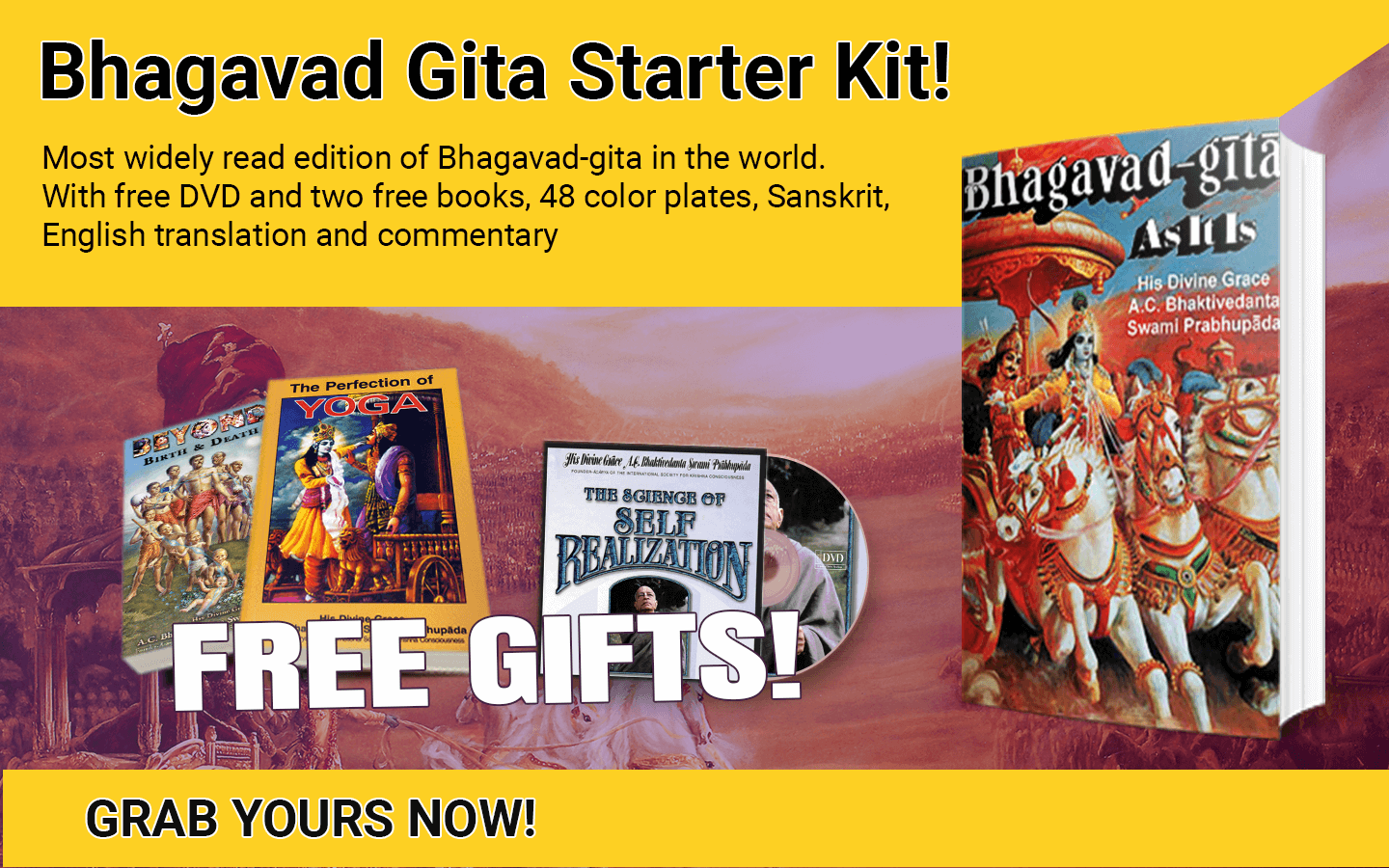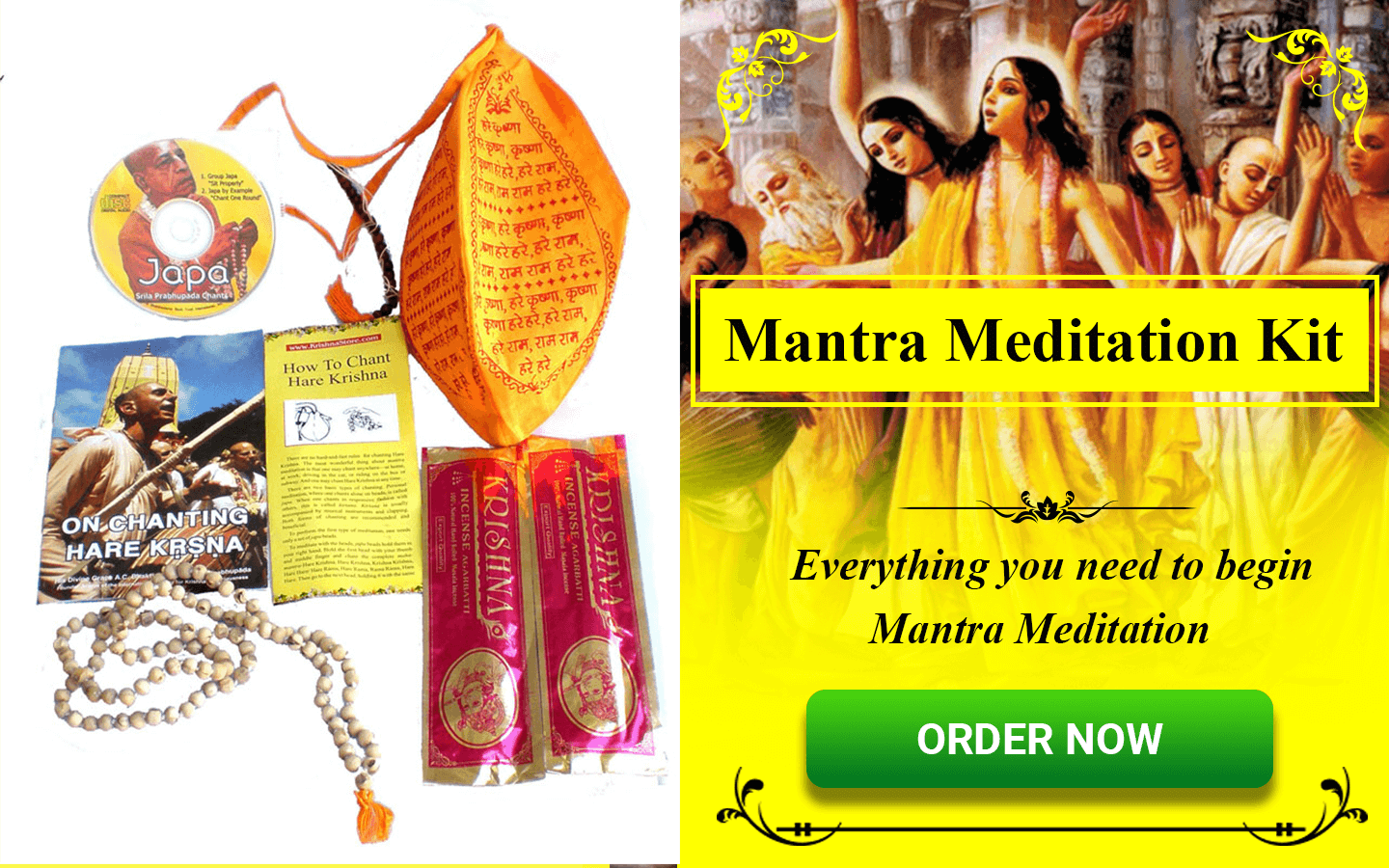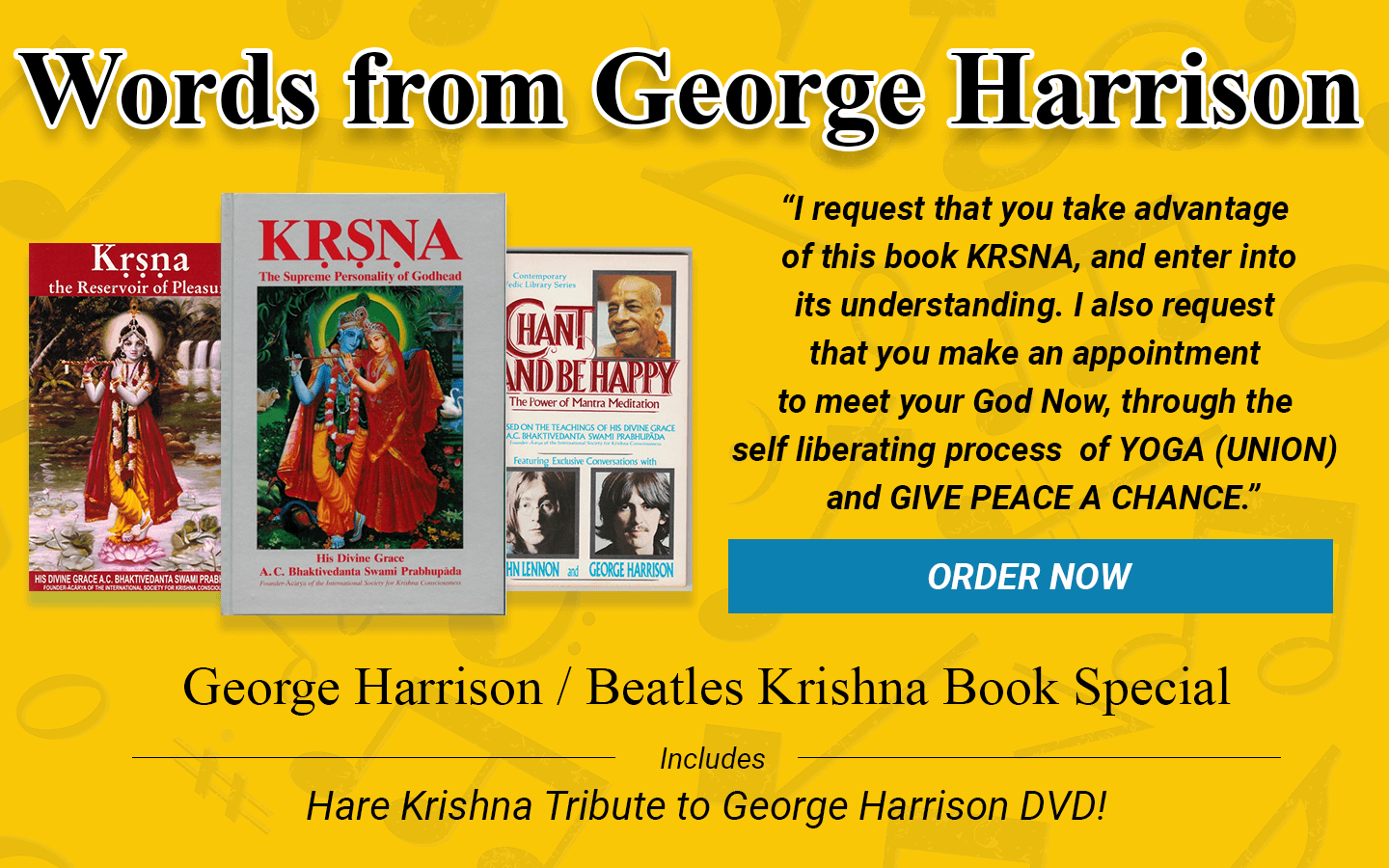Bhagavad Gita, Chapter 1: Observing the Armies on the Battlefield of Kuruksetra
Chapter 1, Verse 1
Dhrtarastra said: O Sanjaya, after assembling in the place of pilgrimage at Kuruksetra, what did my sons and the sons of Pandu do, being desirous to fight?
Chapter 1, Verse 2
Sanjaya said: O King, after looking over the army gathered by the sons of Pandu, King Duryodhana went to his teacher and began to speak the following words:
Chapter 1, Verse 3
O my teacher, behold the great army of the sons of Pandu, so expertly arranged by your intelligent disciple, the son of Drupada.
Chapter 1, Verse 4
Here in this army there are many heroic bowmen equal in fighting to Bhima and Arjuna; there are also great fighters like Yuyudhana, Virata and Drupada.
Chapter 1, Verse 5
There are also great, heroic, powerful fighters like Dhrstaketu, Cekitana, Kasiraja, Purujit, Kuntibhoja and Saibya.
Chapter 1, Verse 6
There are the mighty Yudhamanyu, the very powerful Uttamauja, the son of Subhadra and the sons of Draupadi. All these warriors are great chariot fighters.
Chapter 1, Verse 7
O best of the brahmanas, for your information, let me tell you about the captains who are especially qualified to lead my military force.
Chapter 1, Verse 8
There are personalities like yourself, Bhisma, Karna, Krpa, Asvatthama, Vikarna and the son of Somadatta called Bhurisrava, who are always victorious in battle.
Chapter 1, Verse 9
There are many other heroes who are prepared to lay down their lives for my sake. All of them are well equipped with different kinds of weapons, and all are experienced in military science.
Chapter 1, Verse 10
Our strength is immeasurable, and we are perfectly protected by Grandfather Bhisma, whereas the strength of the Pandavas, carefully protected by Bhima, is limited.
Chapter 1, Verse 11
Now all of you must give full support to Grandfather Bhisma, standing at your respective strategic points in the phalanx of the army.
Chapter 1, Verse 12
Then Bhisma, the great valiant grandsire of the Kuru dynasty, the grandfather of the fighters, blew his conchshell very loudly like the sound of a lion, giving Duryodhana joy.
Chapter 1, Verse 13
After that, the conchshells, bugles, trumpets, drums and horns were all suddenly sounded, and the combined sound was tumultuous.
Chapter 1, Verse 14
On the other side, both Lord Krsna and Arjuna, stationed on a great chariot drawn by white horses, sounded their transcendental conchshells.
Chapter 1, Verse 15
Then, Lord Krsna blew His conchshell, called Pancajanya; Arjuna blew his, the Devadatta; and Bhima, the voracious eater and performer of Herculean tasks, blew his terrific conchshell called Paundram.
Chapter 1, Verse 16-18
King Yudhisthira, the son of Kunti, blew his conchshell, the Anantavijaya, and Nakula and Sahadeva blew the Sughosa and Manipuspaka. That great archer the King of Kasi, the great fighter Sikhandi, Dhrstadyumna, Virata and the unconquerable Satyaki, Drupada, the sons of Draupadi, and the others, O King, such as the son of Subhadra, greatly armed, all blew their respective conchshells.
Chapter 1, Verse 19
The blowing of these different conchshells became uproarious, and thus, vibrating both in the sky and on the earth, it shattered the hearts of the sons of Dhrtarastra.
Chapter 1, Verse 20
O King, at that time Arjuna, the son of Pandu, who was seated in his chariot, his flag marked with Hanuman, took up his bow and prepared to shoot his arrows, looking at the sons of Dhrtarastra. O King, Arjuna then spoke to Hrsikesa [Krsna] these words:
Chapter 1, Verse 21-22
Arjuna said: O infallible one, please draw my chariot between the two armies so that I may see who is present here, who is desirous of fighting, and with whom I must contend in this great battle attempt.
Chapter 1, Verse 23
Let me see those who have come here to fight, wishing to please the evil-minded son of Dhrtarastra.
Chapter 1, Verse 24
Sanjaya said: O descendant of Bharata, being thus addressed by Arjuna, Lord Krsna drew up the fine chariot in the midst of the armies of both parties.
Chapter 1, Verse 25
In the presence of Bhisma, Drona and all other chieftains of the world, Hrsikesa, the Lord, said, Just behold, Partha, all the Kurus who are assembled here.
Chapter 1, Verse 26
There Arjuna could see, within the midst of the armies of both parties, his fathers, grandfathers, teachers, maternal uncles, brothers, sons, grandsons, friends, and also his father-in-law and well-wishers-all present there.
Chapter 1, Verse 27
When the son of Kunti, Arjuna, saw all these different grades of friends and relatives, he became overwhelmed with compassion and spoke thus:
Chapter 1, Verse 28
Arjuna said: My dear Krsna, seeing my friends and relatives present before me in such a fighting spirit, I feel the limbs of my body quivering and my mouth drying up.
Chapter 1, Verse 29
My whole body is trembling, and my hair is standing on end. My bow Gandiva is slipping from my hand, and my skin is burning.
Chapter 1, Verse 30
I am now unable to stand here any longer. I am forgetting myself, and my mind is reeling. I foresee only evil, O killer of the Kesi demon.
Chapter 1, Verse 31
I do not see how any good can come from killing my own kinsmen in this battle, nor can I, my dear Krsna, desire any subsequent victory, kingdom, or happiness.
Chapter 1, Verse 32-35
O Govinda, of what avail to us are kingdoms, happiness or even life itself when all those for whom we may desire them are now arrayed in this battlefield? O Madhusudana, when teachers, fathers, sons, grandfathers, maternal uncles, fathers-in-law, grandsons, brothers-in-law and all relatives are ready to give up their lives and properties and are standing before me, then why should I wish to kill them, though I may survive? O maintainer of all creatures, I am not prepared to fight with them even in exchange for the three worlds, let alone this earth.
Chapter 1, Verse 36
Sin will overcome us if we slay such aggressors. Therefore it is not proper for us to kill the sons of Dhrtarastra and our friends. What should we gain, O Krsna, husband of the goddess of fortune, and how could we be happy by killing our own kinsmen?
Chapter 1, Verse 37-38
O Janardana, although these men, overtaken by greed, see no fault in killing one's family or quarreling with friends, why should we, with knowledge of the sin, engage in these acts?
Chapter 1, Verse 39
With the destruction of dynasty, the eternal family tradition is vanquished, and thus the rest of the family becomes involved in irreligious practice.
Chapter 1, Verse 40
When irreligion is prominent in the family, O Krsna, the women of the family become corrupt, and from the degradation of womanhood, O descendant of Vrsni, comes unwanted progeny.
Chapter 1, Verse 41
When there is increase of unwanted population, a hellish situation is created both for the family and for those who destroy the family tradition. In such corrupt families, there is no offering of oblations of food and water to the ancestors.
Chapter 1, Verse 42
Due to the evil deeds of the destroyers of family tradition, all kinds of community projects and family welfare activities are devastated.
Chapter 1, Verse 43
O Krsna, maintainer of the people, I have heard by disciplic succession that those who destroy family traditions dwell always in hell.
Chapter 1, Verse 44
Alas, how strange it is that we are preparing to commit greatly sinful acts, driven by the desire to enjoy royal happiness.
Chapter 1, Verse 45
I would consider it better for the sons of Dhrtarastra to kill me unarmed and unresisting, rather than fight with them.
Chapter 1, Verse 46
Sanjaya said: Arjuna, having thus spoken on the battlefield, cast aside his bow and arrows and sat down on the chariot, his mind overwhelmed with grief.
Copyright (c) 1972 by His Divine Grace A.C. Bhaktivedanta Swami Prabhupada











